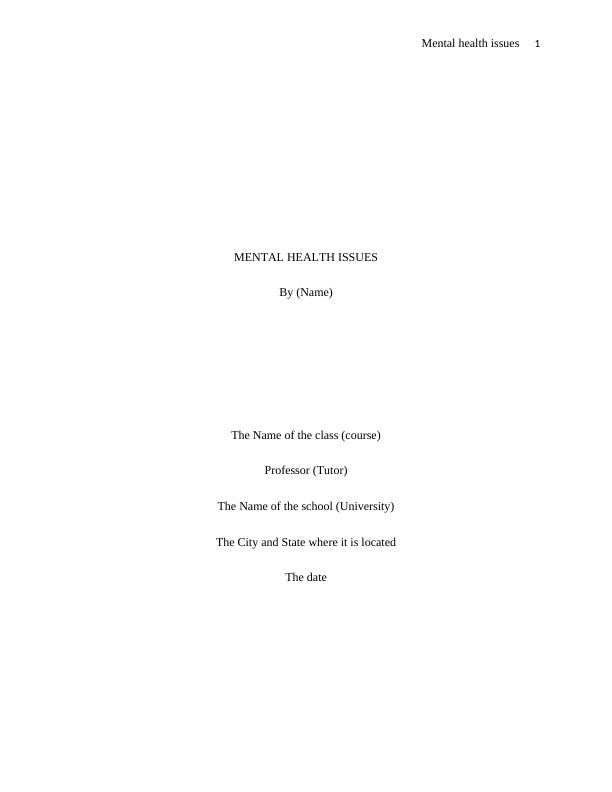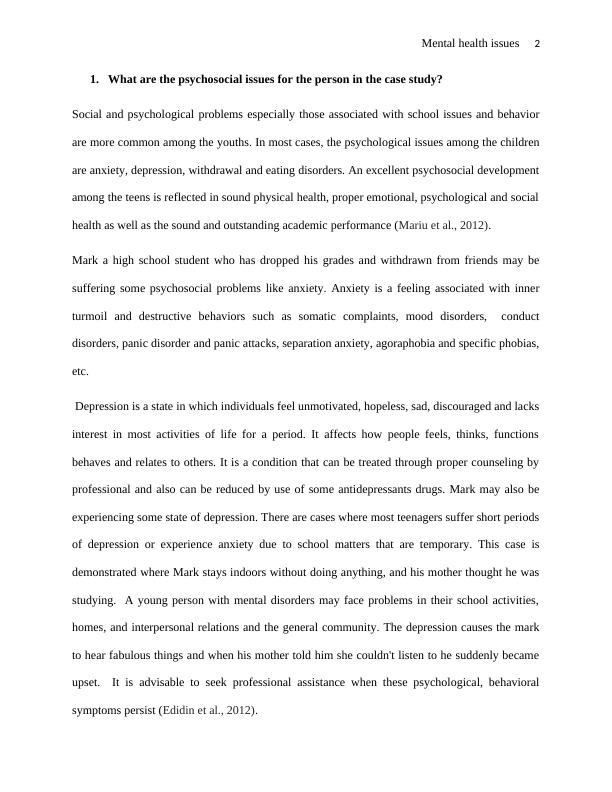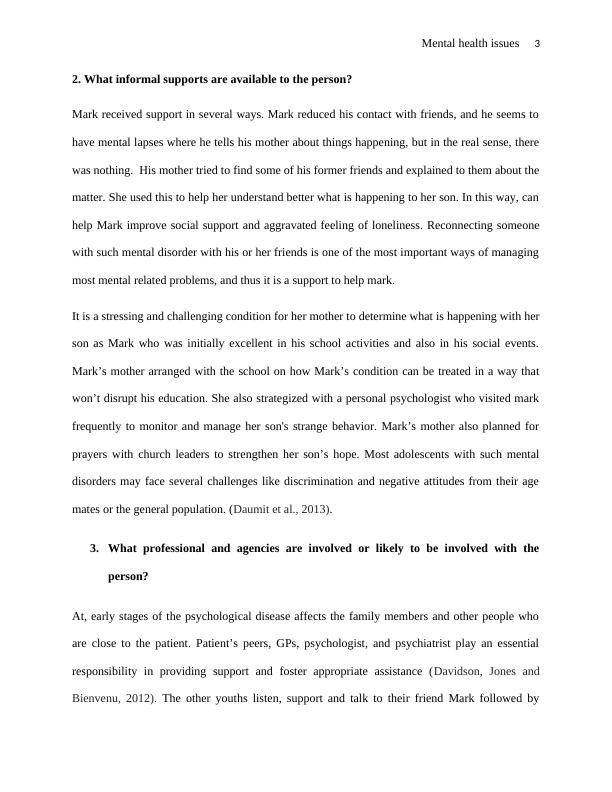Mental Health Issues: Psychosocial Problems, Support, Agencies, Gaps, and Advocacy
Added on 2023-06-12
9 Pages2372 Words292 Views
Mental health issues 1
MENTAL HEALTH ISSUES
By (Name)
The Name of the class (course)
Professor (Tutor)
The Name of the school (University)
The City and State where it is located
The date
MENTAL HEALTH ISSUES
By (Name)
The Name of the class (course)
Professor (Tutor)
The Name of the school (University)
The City and State where it is located
The date

Mental health issues 2
1. What are the psychosocial issues for the person in the case study?
Social and psychological problems especially those associated with school issues and behavior
are more common among the youths. In most cases, the psychological issues among the children
are anxiety, depression, withdrawal and eating disorders. An excellent psychosocial development
among the teens is reflected in sound physical health, proper emotional, psychological and social
health as well as the sound and outstanding academic performance (Mariu et al., 2012).
Mark a high school student who has dropped his grades and withdrawn from friends may be
suffering some psychosocial problems like anxiety. Anxiety is a feeling associated with inner
turmoil and destructive behaviors such as somatic complaints, mood disorders, conduct
disorders, panic disorder and panic attacks, separation anxiety, agoraphobia and specific phobias,
etc.
Depression is a state in which individuals feel unmotivated, hopeless, sad, discouraged and lacks
interest in most activities of life for a period. It affects how people feels, thinks, functions
behaves and relates to others. It is a condition that can be treated through proper counseling by
professional and also can be reduced by use of some antidepressants drugs. Mark may also be
experiencing some state of depression. There are cases where most teenagers suffer short periods
of depression or experience anxiety due to school matters that are temporary. This case is
demonstrated where Mark stays indoors without doing anything, and his mother thought he was
studying. A young person with mental disorders may face problems in their school activities,
homes, and interpersonal relations and the general community. The depression causes the mark
to hear fabulous things and when his mother told him she couldn't listen to he suddenly became
upset. It is advisable to seek professional assistance when these psychological, behavioral
symptoms persist (Edidin et al., 2012).
1. What are the psychosocial issues for the person in the case study?
Social and psychological problems especially those associated with school issues and behavior
are more common among the youths. In most cases, the psychological issues among the children
are anxiety, depression, withdrawal and eating disorders. An excellent psychosocial development
among the teens is reflected in sound physical health, proper emotional, psychological and social
health as well as the sound and outstanding academic performance (Mariu et al., 2012).
Mark a high school student who has dropped his grades and withdrawn from friends may be
suffering some psychosocial problems like anxiety. Anxiety is a feeling associated with inner
turmoil and destructive behaviors such as somatic complaints, mood disorders, conduct
disorders, panic disorder and panic attacks, separation anxiety, agoraphobia and specific phobias,
etc.
Depression is a state in which individuals feel unmotivated, hopeless, sad, discouraged and lacks
interest in most activities of life for a period. It affects how people feels, thinks, functions
behaves and relates to others. It is a condition that can be treated through proper counseling by
professional and also can be reduced by use of some antidepressants drugs. Mark may also be
experiencing some state of depression. There are cases where most teenagers suffer short periods
of depression or experience anxiety due to school matters that are temporary. This case is
demonstrated where Mark stays indoors without doing anything, and his mother thought he was
studying. A young person with mental disorders may face problems in their school activities,
homes, and interpersonal relations and the general community. The depression causes the mark
to hear fabulous things and when his mother told him she couldn't listen to he suddenly became
upset. It is advisable to seek professional assistance when these psychological, behavioral
symptoms persist (Edidin et al., 2012).

Mental health issues 3
2. What informal supports are available to the person?
Mark received support in several ways. Mark reduced his contact with friends, and he seems to
have mental lapses where he tells his mother about things happening, but in the real sense, there
was nothing. His mother tried to find some of his former friends and explained to them about the
matter. She used this to help her understand better what is happening to her son. In this way, can
help Mark improve social support and aggravated feeling of loneliness. Reconnecting someone
with such mental disorder with his or her friends is one of the most important ways of managing
most mental related problems, and thus it is a support to help mark.
It is a stressing and challenging condition for her mother to determine what is happening with her
son as Mark who was initially excellent in his school activities and also in his social events.
Mark’s mother arranged with the school on how Mark’s condition can be treated in a way that
won’t disrupt his education. She also strategized with a personal psychologist who visited mark
frequently to monitor and manage her son's strange behavior. Mark’s mother also planned for
prayers with church leaders to strengthen her son’s hope. Most adolescents with such mental
disorders may face several challenges like discrimination and negative attitudes from their age
mates or the general population. (Daumit et al., 2013).
3. What professional and agencies are involved or likely to be involved with the
person?
At, early stages of the psychological disease affects the family members and other people who
are close to the patient. Patient’s peers, GPs, psychologist, and psychiatrist play an essential
responsibility in providing support and foster appropriate assistance (Davidson, Jones and
Bienvenu, 2012). The other youths listen, support and talk to their friend Mark followed by
2. What informal supports are available to the person?
Mark received support in several ways. Mark reduced his contact with friends, and he seems to
have mental lapses where he tells his mother about things happening, but in the real sense, there
was nothing. His mother tried to find some of his former friends and explained to them about the
matter. She used this to help her understand better what is happening to her son. In this way, can
help Mark improve social support and aggravated feeling of loneliness. Reconnecting someone
with such mental disorder with his or her friends is one of the most important ways of managing
most mental related problems, and thus it is a support to help mark.
It is a stressing and challenging condition for her mother to determine what is happening with her
son as Mark who was initially excellent in his school activities and also in his social events.
Mark’s mother arranged with the school on how Mark’s condition can be treated in a way that
won’t disrupt his education. She also strategized with a personal psychologist who visited mark
frequently to monitor and manage her son's strange behavior. Mark’s mother also planned for
prayers with church leaders to strengthen her son’s hope. Most adolescents with such mental
disorders may face several challenges like discrimination and negative attitudes from their age
mates or the general population. (Daumit et al., 2013).
3. What professional and agencies are involved or likely to be involved with the
person?
At, early stages of the psychological disease affects the family members and other people who
are close to the patient. Patient’s peers, GPs, psychologist, and psychiatrist play an essential
responsibility in providing support and foster appropriate assistance (Davidson, Jones and
Bienvenu, 2012). The other youths listen, support and talk to their friend Mark followed by

End of preview
Want to access all the pages? Upload your documents or become a member.
Related Documents
Mental Health in the Community: Psychosocial Issues, Informal Supports, Professionals, Gaps, and Advocacylg...
|10
|2423
|337
Mental Health Treatmentlg...
|8
|1840
|439
Mental Health Illnesslg...
|6
|1953
|242
Dimensions of Physical and Mental Healthlg...
|11
|3201
|169
Psychology Assignment (Doc)lg...
|5
|1109
|234
Understanding Depression/Overdose with Psychosis: A Case Study of Jenna Taylor, 18 years oldlg...
|11
|2782
|142
